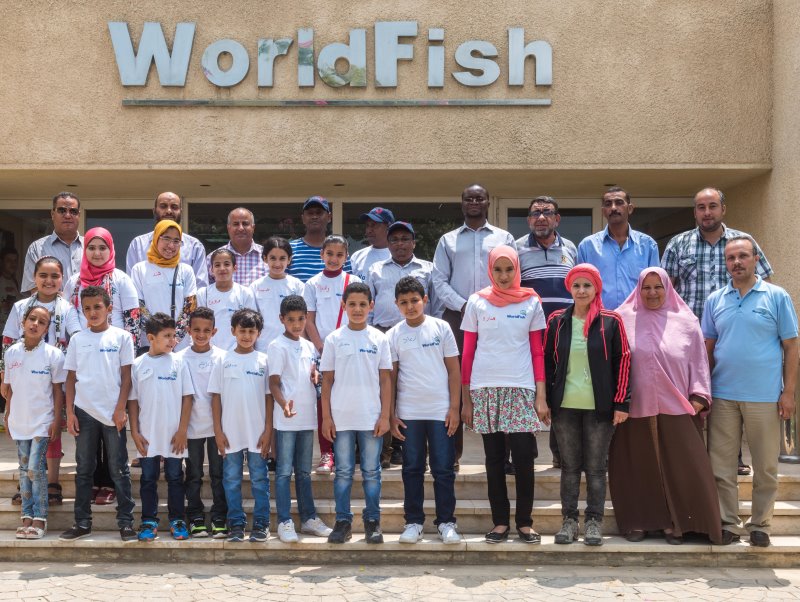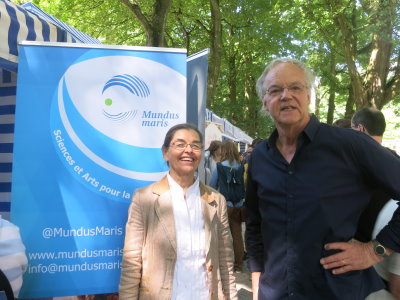 Our Ocean, Our Future - this year's motto of World Oceans Day inspired the Mundus maris booth at the Environment Festival in the Cinquantenaire Park in Brussels, Belgium, on 4 June. With the opening of the first time ever UN Oceans Conference only two days away, and given the interactive programme on offer at the booth, the ocean was at the centre of the visitors' interest. Brussels set off a series of events organised by and/or with Mundus maris.
Our Ocean, Our Future - this year's motto of World Oceans Day inspired the Mundus maris booth at the Environment Festival in the Cinquantenaire Park in Brussels, Belgium, on 4 June. With the opening of the first time ever UN Oceans Conference only two days away, and given the interactive programme on offer at the booth, the ocean was at the centre of the visitors' interest. Brussels set off a series of events organised by and/or with Mundus maris.
The core themes addressed were overfishing, pollution and climate change and what we can together do about them.
1. Overfishing
Overfishing is probably still the number one threat to the ocean and its ecosystems. A recent study - the most comprehensive ever carried out about the state of populations in European waters covering 397 stocks - demonstrated that fully 85 percent of stocks of fish and seafood in European waters are currently below healthy levels. But the study also showed that, if managed to recover, fisheries could harvest 57 percent or five million tons more on a sustainable basis! We covered the story earlier - click here for more.
The picture is particularly bleak in the Mediterranean, where fish populations are so depleted that they can not produce anywhere near the high and sustainable catches mandated by the reformed European Common Fisheries Policy (CFP). Urgent protection and reduced fishing mortality are essential to allow recovery. The good news is that it is possible to achieve, as we heard during a recent hearing in the Fisheries Committee in the European Parliament.
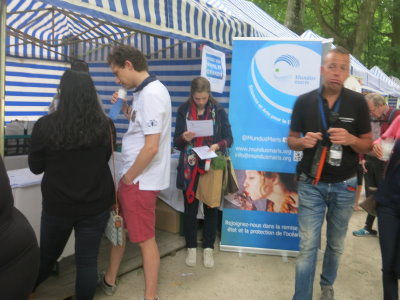 In other parts of the world there are also some signs that recovery is taking place, but incomplete reporting of governments to the Food and Agriculture Organization of the UN (FAO) makes it difficult even for people working in the sector to have a realistic picture. This notwithstanding, shrinking sizes of catches and the size of fish in many of these catches and poor economic health of many fishing operations are indicators of the urgent need to reform. A particularly nasty issue is the still very high level of illegal, unreported and unregulated fishing (IUU fishing), particularly in developing country waters, e.g. off West Africa. In our recent presentation at the EGU Conference, we argued that these are criminal practices of internationally operating syndicates must not be understood and tackled as ordinary fisheries management. Indeed, they have become the focus of a new line of work of Interpol. We also strongly argue for hitting the fraudsters where it hurts, particularly in denying them access to the rich markets in Europe and other wealthy countries and regions to prevent them from realising their illicit profits. Boosting monitoring, control, surveillance and law enforcement in developing countries would be another pillar to curb the criminal practices. That would be a lucrative investment for countries strapped of resources to finance development efforts.
In other parts of the world there are also some signs that recovery is taking place, but incomplete reporting of governments to the Food and Agriculture Organization of the UN (FAO) makes it difficult even for people working in the sector to have a realistic picture. This notwithstanding, shrinking sizes of catches and the size of fish in many of these catches and poor economic health of many fishing operations are indicators of the urgent need to reform. A particularly nasty issue is the still very high level of illegal, unreported and unregulated fishing (IUU fishing), particularly in developing country waters, e.g. off West Africa. In our recent presentation at the EGU Conference, we argued that these are criminal practices of internationally operating syndicates must not be understood and tackled as ordinary fisheries management. Indeed, they have become the focus of a new line of work of Interpol. We also strongly argue for hitting the fraudsters where it hurts, particularly in denying them access to the rich markets in Europe and other wealthy countries and regions to prevent them from realising their illicit profits. Boosting monitoring, control, surveillance and law enforcement in developing countries would be another pillar to curb the criminal practices. That would be a lucrative investment for countries strapped of resources to finance development efforts.
We also showed some means and ways in which citizens can take action beyond active participation in parliamentary elections and other forms of representative democracy. Our pedagogical tools, such as fish rulers for different parts of Europe and the world attracted considerable interest. We could also point to seafood advisories for responsible consumption. We had to caution, however, against bad labelling of the Marine Stewardship Council (MSC) in still about 40 to 50 percent of the cases, where they grant the label to fisheries not meeting the sustainability criteria. Here we argue they need to clear up their act not to abuse consumers' trust and confer unfair commercial advantage on companies not playing by the rules.
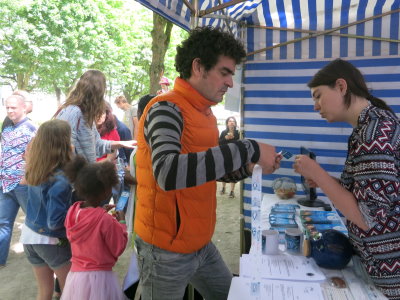 The take home message is: yes, it is possible to fight overfishing and criminal practices in fisheries. Research is producing independent assessments. Citizens, governments and companies can use these for turning the tide. And yes, citizens can contribute significantly to turning the situation around through political engagement, attentive consumption and helping to reduce waste in all its forms. Public institutions and companies have a particular responsibility to enforce and apply existing legislation and not placing further obstacles in the way of the new anti-subsidy discipline nearing adoption in the World Trade Organization (WTO). The local affects the global and vice-versa. So it's worth engaging also at individual level.
The take home message is: yes, it is possible to fight overfishing and criminal practices in fisheries. Research is producing independent assessments. Citizens, governments and companies can use these for turning the tide. And yes, citizens can contribute significantly to turning the situation around through political engagement, attentive consumption and helping to reduce waste in all its forms. Public institutions and companies have a particular responsibility to enforce and apply existing legislation and not placing further obstacles in the way of the new anti-subsidy discipline nearing adoption in the World Trade Organization (WTO). The local affects the global and vice-versa. So it's worth engaging also at individual level.
2. Pollution
The most serious threat to ocean health in this field is widespread overfertilisation of semi-enclosed seas from agricultural run-off and untreated urban waste waters, which create vast dead zones. These appear e.g. in the Baltic and the Black Sea because freshwater highly loaded with nitrates and phosphates from excess fertilisation provoke algae blooms in the sea. During blooms the grazers of algae can not keep up. Thus, the dead bodies of many algae sink to the bottom where they are digested by bacteria and fungi consuming all available oxygen in the process. When oxygen is in short supply only specialised micro-organisms e.g. those living on sulphur or methane as an energy source can survive. Fish and other mobile animals will move out of the area, if they can. Such areas are called dead zones because of their life threatening conditions.
The type of pollution most in the public eye is, of course, plastic pollution. We have reported regularly about it since 2012 and the powerful images of plastic bottles choking rivers particularly in Asia and plastic bag suffocating endangered turtles have captured many people's imagination. Many visitors at the stand confirmed they already reduced or abandoned use particularly of one-way plastic bags and sought other means and ways to prevent more plastic getting into the ocean.
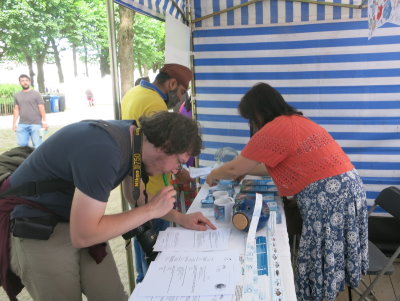 Take home message: Doing something about plastic pollution of beaches, helping in clean-ups, and also taking practical steps of reducing one's own CO2 emissions for climate protection was a recurrent part of the conversations and the pledges several visitors wrote down as a firm commitment towards the ocean. Yes we can, but a really big effort is required to change our ways. Some on-going changes to agricultural practices and efforts by citizens as well as companies hearing the message of reduced and changing packaging point in the right direction. Time to scale up a lot!
Take home message: Doing something about plastic pollution of beaches, helping in clean-ups, and also taking practical steps of reducing one's own CO2 emissions for climate protection was a recurrent part of the conversations and the pledges several visitors wrote down as a firm commitment towards the ocean. Yes we can, but a really big effort is required to change our ways. Some on-going changes to agricultural practices and efforts by citizens as well as companies hearing the message of reduced and changing packaging point in the right direction. Time to scale up a lot!
3. Climate change
This mega challenge was very present in people's mind at the festival. Many visitors at our stand had heard about wide-spread coral bleaching and even death as a result of warming of surface waters of the ocean. We have repeatedly reported in our social media on the particularly serious threats to the Great Barrier Reef off Australia, but also other parts of the tropical seas.
What many people are not so aware of so far is that beyond sealevel rise from warming seas - tough enough as a pervasive, measurable effect - the oxygen level of warmer waters is much less than in cooler waters. We already observe that bigger fish in need of well oxygenated waters are avoiding warmer seas as a result. The combined effect of warmer water and less oxygen in the ocean already leads to a poleward movement of many mobile marine animals seeking to stay within their preferred environmental conditions. Sometimes it won't work, because they need shallow water and cannot live in deeper, cooler waters or they may hit against a continental land mass and are trapped... These are just a couple of reasons, why ecologists expect huge biodiversity losses as a result of climate change (see also the inspirational text of this year's youth contest for Mundus maris Awards).
Another, still undervalued effect of climate change is ocean acidification. It occurs because the ocean has already taken up a lot of the CO2 emissions provoked by human activities. Otherwise warming would even be more pronounced than it already is. CO2 in water is a light acid. It lowers the pH of seawater to a point where organisms with calcareous skeletons need to spend more energy to keep alive and growing.
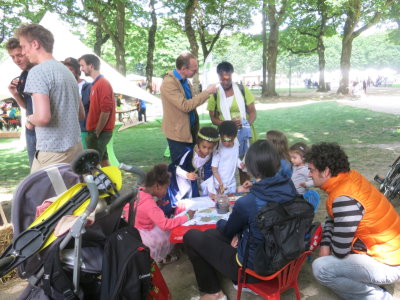 On-site experiments and observations in the ocean have allowed to establish a tentative timeline of reduced growth and decline of different marine organisms with calcareous skeletons if acidification continues unabated. Not a reassuring perspective. Perhaps most worrying is the threat to marine algae which produce the oxygen of every second breath we take.
On-site experiments and observations in the ocean have allowed to establish a tentative timeline of reduced growth and decline of different marine organisms with calcareous skeletons if acidification continues unabated. Not a reassuring perspective. Perhaps most worrying is the threat to marine algae which produce the oxygen of every second breath we take.
Take home message: Awareness was reasonably high, not the least because many aspects of the climate debate were broadly addressed in the mainstream media. The interest to learn more is high, especially on lesser known effects on the ocean. Expand pledging for the ocean by stopping use of plastic bags, reduce plastic bottles and other plastic and make adjustments to daily life that reduce green house gas emissions.
Engage in political life to get the big hitters to comply with the Paris Agenda limiting climate change to less than 2° C warming: these are agriculture, individual traffic (thus primarily the automotive industry and changing to more collective or emission-free movement), heating / cooling of buildings, Last but not least get maritime shipping, responsible for fully six percent of global emissions, to reduce its footprint drastically.
Good interactions
Throughout the day, the Mundus maris team of members and volunteers had good interactions with visitors. Many participated in the ocean quiz and the winner was only announced at 18h because demand for participation did not stop earlier. A number of people also made pledges for the ocean and some wanted to contribute specifically to ocean awareness and protection with suggestions we are happy to follow-up.
The untiring enthusiasm of the kids for splashing water colours on the Mundus maris mascots, Samba and Kumba, gave some breathing space to parents and produced some truly colourful decoration for the stand. Young ocean-lovers come forward to enjoy its beauty still tomorrow.
Check here the winners of the Mundus maris Awards of this year. Congratulations to the winners and all participants as well as to all teachers, supporters and the international jury who all have been contributing to make the youth contest again a great success.
Photos are by CE Nauen unless indicated otherwise.
World Oceans Day in Yoff, Senegal, with kids questioning fishers about marine ecosystems
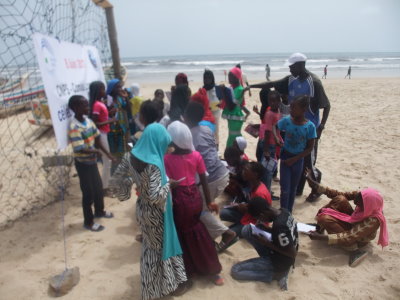 The local fishermen's committee, part of the National Collective of Fishermen in Senegal (CNPS), and the El Hadj Talla Diagne primary school celebrated World Oceans Day on 8 June 2017 in the fishing village of Yoff.
The local fishermen's committee, part of the National Collective of Fishermen in Senegal (CNPS), and the El Hadj Talla Diagne primary school celebrated World Oceans Day on 8 June 2017 in the fishing village of Yoff.
The fishers wanted use the Day for a clean up of the beach as a mark of their respect for the sea and recognition of its importance for their livelihoods. The beach had acculmuated unhealthy levels of pollution with household waste such that the fishers under the leadership of one of their members in the Environment Committee of the municipality decided enough was enough. This situation of insalubrity created manifold negative impacts directly felt by the population, for example difficulties for the fishers to repair their nets on the beach.
The extent of littering was such that even the favourite sport of the young people, beach soccer, could only be played with difficulties. Thus the call for the beach clean-up met with a good response. Afterwards, the group of young people between the ages of 10 and 12 years helping with the clean up took immediate advantage by playing an unimpeded match.
This cleaning operation took place early in the morning between 9:00 and 10:30 despite ramadan. Subsequently, with the coordination of Mr Mamadou Mbaye, chairman of the local fisheries committee, the local committee, in the presence of the president of the Mundus maris Club - Senegal, met under the shelter arranged on the beach. The shelter is the meeting place for fishers, where the discuss all problems of the community. The aim of this small meeting was to prepare the arrival of the pupils of El Hadji Diagne school.
What did the school contribute? Indeed, this school, which wanted to celebrate June 8, World Oceans Day, for the first time had the following programme:
1. It started with a meeting of its pedagogical team under the supervision of the director Mrs Ndiaye;
2. During a preparatory phase for the descent of the pupils onto the beach to meet the fishermen these young people have prepared their burning questions and which they intended to pose, in particular the pollution of the littoral. During this session, students divided up the questions;
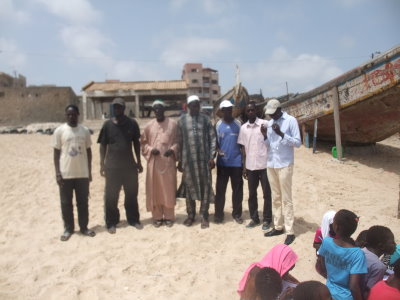 3. A briefing of the pupils participating in the day: explanation in class about why World Oceans Day is organised. This part was assured thanks to the unwavering commitment of the teachers Messrs Dial Samb (master of CMI) and Pape Ndiaga Wadj (master of CEII). It was on this occasion that the inspirational text (designed for the needs of the international youth contest on the Mundus maris website) was explained by these two teachers. This was followed by a drawing session by the students on the topic of pollution of the oceans;
3. A briefing of the pupils participating in the day: explanation in class about why World Oceans Day is organised. This part was assured thanks to the unwavering commitment of the teachers Messrs Dial Samb (master of CMI) and Pape Ndiaga Wadj (master of CEII). It was on this occasion that the inspirational text (designed for the needs of the international youth contest on the Mundus maris website) was explained by these two teachers. This was followed by a drawing session by the students on the topic of pollution of the oceans;
4. Another part of the celebration was devoted to an innovative tripartite exchange between teachers, pupils and fishers about the teaching materials of the Ecosystem Approach to Fisheries (EAF). This sequence took place in the shelter of the fishers. The exercise benefited from the facilitation of the Mundus maris representative, who had contributed to the development of the teaching kit. He explained the key principles of EAF and illustrated by means of the fish ruler the importance of respecting the minimum size at sexual maturity of the target fish species if we want to make the fishery a socially, economically and environmentally sustainable activity;
5. Finally, to close the day, while they were in the shelter of the fishers, the pupils asked their questions, which were answered by the fishers. Whenever necessary, the representative of Mundus maris provided explanations to some technical questions relating to the EAF. He illustrationed the replies with examples to make sure they be understood by the pupils.
The pupils chosen by the school to ask these questions were: Fatoumata SY, Bousso DIOP, Ndella NDIAYE, Ndeye Maty GAYE, and Khady DIALLO. They were all girls. The latter is the "Minister of Environment" within a "government" set up within the school. As a reminder, El Hadj Talla DIAGNE school is part of three pilot schools in Senegal where "governments" are set up with a president and ministries.
World Oceans Day in Buenos Aires, Argentina
 You may think first of tango, gaucho Don Segundo Sombra, great beef, wines, soja and Terra del Fuego when thinking of Argentina. But on Friday, June 9, the University of Belgrano, Buenos Aires, and Mundus maris joined forces to celebrate World Oceans Day for the first time in this city. The event was attended by a number of speakers from different organisations and specialists who shared their wide range of knowledge and - from their different perspectives - expressed their commitment to the protection of the marine environment.
You may think first of tango, gaucho Don Segundo Sombra, great beef, wines, soja and Terra del Fuego when thinking of Argentina. But on Friday, June 9, the University of Belgrano, Buenos Aires, and Mundus maris joined forces to celebrate World Oceans Day for the first time in this city. The event was attended by a number of speakers from different organisations and specialists who shared their wide range of knowledge and - from their different perspectives - expressed their commitment to the protection of the marine environment.
The audience was mainly made up of students from five universities. The main purpose of the meeting was to raise awareness, especially among younger generations, of the importance of the Argentine marine waters for the country's economy as well as for the protection of life in the oceans in interdependence with the systems of life on land. Emphasis was placed on the need to achieve more sustainable development, which would allow the maintenance of labor sources while ensuring the conservation of the invaluable nature that characterises one of the richest areas of the Atlantic Ocean.
At the beginning of the event, after the opening words of Dr. Lilián Ferré, representing the Rector and Dean of the Faculty of Exact and Natural Sciences, the institutional video of the event was projected, in memory of Argentine writer Jorge Luis Borges.
 The president of Mundus maris, Dr. Cornelia E Nauen, then took the floor emphasising the three main threats facing the oceans today: overfishing, pollution and climate change. She encouraged remedial action from local to global to overcome the threats and unlined that everyone could and should do something to give back to the ocean for all the goods and services it had already provided to humans.
The president of Mundus maris, Dr. Cornelia E Nauen, then took the floor emphasising the three main threats facing the oceans today: overfishing, pollution and climate change. She encouraged remedial action from local to global to overcome the threats and unlined that everyone could and should do something to give back to the ocean for all the goods and services it had already provided to humans.
Afterwards, Lic. Gabriel Blanco of the Instituto Nacional de Investigación y Desarrollo Pesquero (INIDEP), explained the importance of the onboard observer programme as well as the research campaigns to assess the state of the marine resources in Argentina. Lic. Guillermo Cañete, Fundación Vida Silvestre, explained what they are doing to achieve setting up five marine protected areas in Argentine waters.
The biologist Aníbal Seleme, President of the Federación de Asociaciones Profesionales de Graduados en Ciencias Biológicas (FAPBIO), drew attention on human misconduct in the face of beached marine mammals. He gave concrete examples and suggested how to educate people to reverse these behaviours.
 In Argentina, unlike some other countries in Latin America, sport fishing is practiced. The Club of Fishermen of Buenos Aires, represented by its president, CPN Ángel Colombo, and two members of the Board of Directors, Lic. Magdalena Contreras and Ing. Leandro Gurruchaga, described the club's educational activities to promote sport fishing with subsequent release. They also elaborated on the actions taken to achieve the enactment of laws that make this practice mandatory.
In Argentina, unlike some other countries in Latin America, sport fishing is practiced. The Club of Fishermen of Buenos Aires, represented by its president, CPN Ángel Colombo, and two members of the Board of Directors, Lic. Magdalena Contreras and Ing. Leandro Gurruchaga, described the club's educational activities to promote sport fishing with subsequent release. They also elaborated on the actions taken to achieve the enactment of laws that make this practice mandatory.
Dr. Patricia Morales of the Catholic University of Leuven, Belgium, and President of Terra curanda, showed another facet of the struggle for life in the seas, in reference to the refuge that many people seek in other parts of the planet, crossing the difficult waters that separate the continents.
The artist Gonzalo Álvarez explained how he seeks to make children discover their love for nature and life through the arts.
We know that afforestation helps to mitigate the acidification of the oceans. Lic. Manuel Szwarc talked about the concrete afforestation activities with native trees undertaken by the organisation Árboles sin fronteras. Dr. Carolina Luchetti, President of the Asociación de Graduados en Ciencias Biológicas (CABA), highlighted the magnificent opportunity offered by such a meeting to share ideas and concepts for the benefit of our planet.
Dr. Marcelo Morales Yokobori, in charge of the Chairs Marine Resources and Ecology and Conservation at the University Belgrano, conducted the programme for the organizers of the event.
In this way, the meeting echoed the message of United Nations Secretary General, António Guterres, who said that World Oceans Day provided an important opportunity to promote a sustainable future.
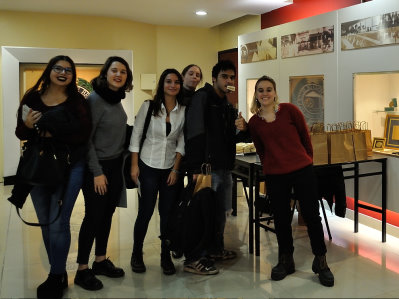 In a large metropolis such as Buenos Aires, far from the sea proper but linked to it through the Plata estuary (the "Dulce Mar" as we say metaphorically) shared with the Republic of Uruguay, actions are necessary to increase awareness of the importance of the oceans for life in the country and on the whole planet.
In a large metropolis such as Buenos Aires, far from the sea proper but linked to it through the Plata estuary (the "Dulce Mar" as we say metaphorically) shared with the Republic of Uruguay, actions are necessary to increase awareness of the importance of the oceans for life in the country and on the whole planet.
But the information does not reach easily. In the words of one of the speakers of this event, the biologist Guillermo Cañete, we should strive for a way not only to think rationally about the sea, but also develop an emotional bond. Feeling part of the problem and its solution, not just as a spectator, is necessary to achieving the objectives of the Agenda 2030 for Sustainable Development.
Towards the end of the event the certificates were delivered to the speakers, with closing remarks from Dr. Lilián Ferré, followed by a lunch invitation by Mundus maris.
We are thankful to the University of Belgrano, and especially Dr. Hernán Aldana Marcos, Dean of the Faculty of Exact and Natural Sciences, and the formidable team of students of the Biology course for making this event possible.
Text by Dr Marcelo Morales Yokobori, photos by Paula, Constanza and Juan Marco.
World Oceans Day in Douala, Cameroon
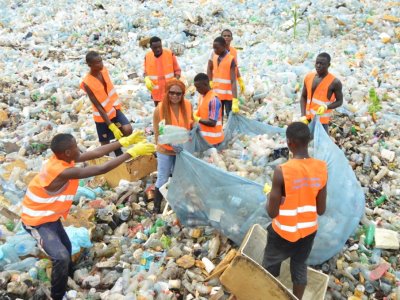 by Jeauberte Djamou, Bénévoles des Océans, our partner in Cameroon
by Jeauberte Djamou, Bénévoles des Océans, our partner in Cameroon
1. Our human investment into a livable environment
As a prelude to the celebration of World Oceans Day on June 8th we organised a human investment session on June 4, 2017 in a river in the heart of the city of Douala, at the place called Billongue.
We chose this river because the city drains all its waste waters and garbage into its bed. Therefore it was imperative and true to the objectives of our association that our action be carried out specifically in this place.
The activity took place on June 4th from 7am in the presence of some thirty young people. A priori this place has all the characteristics of a dump of plastic bottles. Even though we obviously have to do with a river, the clogging by all kinds of waste has forced the original river to change its bed.
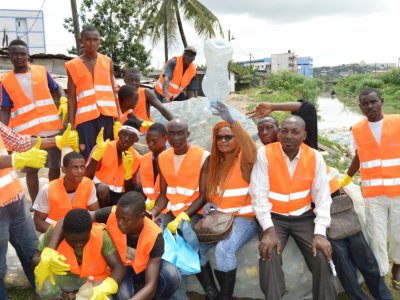 Our action on the ground was mainly to clean up this riverbed from the waste that encumbered it and made the water foul in order to make the environment livable again.
Our action on the ground was mainly to clean up this riverbed from the waste that encumbered it and made the water foul in order to make the environment livable again.
We were shocked by the extent of the degradation. We have done a remarkable job during the clean-up. But as no proper waste management plan seems to exist, we will continue to mobilise for a more structured solution.
We fear that otherwise our one-time effort will not have the expected effects and that similar problems will continue to exist in this and other places in Douala.
2. The celebration
The gathering took place in front of the offices of the Governor of the Littoral with 150 children of the pilot schools of Douala in attendance.
They sang the song of Vivien AKOA, winner of a Mundus maris Awards Shark Prize 2017 for about thirty minutes; Stop that, the pollution ..., before starting the march towards the Delegation of Tourism and Leisure where the festivities took place in the presence of the administration of the Littoral.
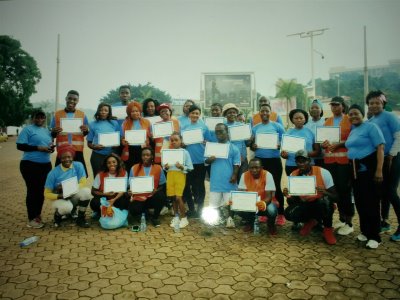 After the speech of Mr Samvam Yara, Head of the Economic, Social and Cultural Affairs Division of the Littoral Region, representing the Governo, who was prevented from participation due to another commitment, we issued the honorary diplomas of participation in the Mundus maris Awards youth contest 2017.
After the speech of Mr Samvam Yara, Head of the Economic, Social and Cultural Affairs Division of the Littoral Region, representing the Governo, who was prevented from participation due to another commitment, we issued the honorary diplomas of participation in the Mundus maris Awards youth contest 2017.
The Head of administration handed the diplomas out to the participants present.
It is also an opportunity to thank the Honorable Paul Eric Djomgoue, Deputy of Nfoundi, for his support, as well as the City Council of Douala III and the Autonomous Port of Douala.
3. Closure
The Oceans Volunteers of Cameroon concluded the activities related to the celebration of the World Oceans Day by a sporting walk of about 15 km in the district of Yaoundé II. Some sixty volunteers participated.
On a cool morning, the departure took place at the esplanade of the Sub-Prefecture of Tsinga. After a photo shoot at the esplanade of the Yaounde Congress Center we launched our walk under the curious glances of the passers-by.
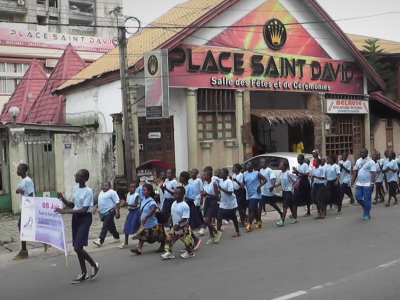 At the halfway point we held a stretching session and then continued our journey.
At the halfway point we held a stretching session and then continued our journey.
After three hours of clock time, we returned to the Esplanade of the Sub-Prefecture where we received the Honorary Diplomas for the participation in the contest for the Mundus maris prize on the protection of the oceans of the applicants and parents of children who could not be present at the earlier ceremony. A family photo was taken as a souvenir.
We finally joined the Volunteer Headquarters where awards were presented to the winners. We have developed a road map for the continuation of our activities. The winners are very happy with the firm conviction to work for the protection of the oceans and to attract the maximum number of young people to the group.
NB: Even the Commissioner in charge of the escort has become a volunteer!
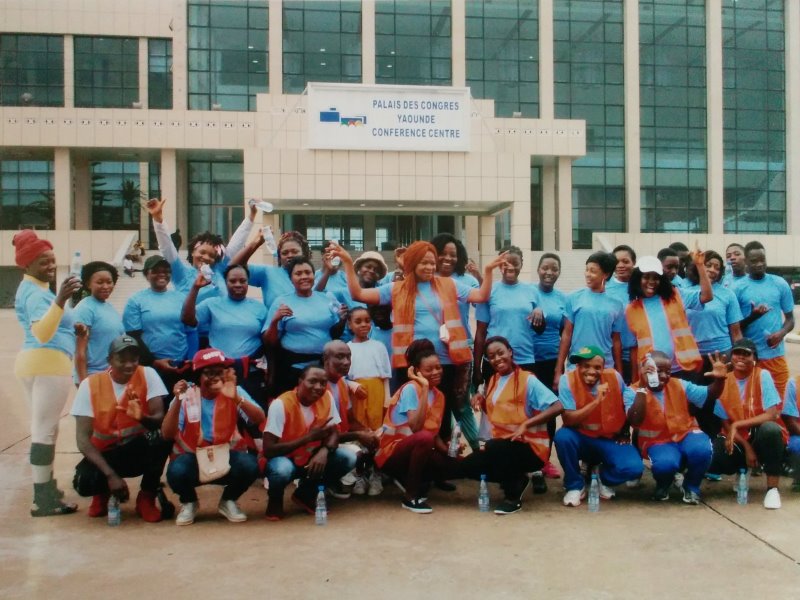
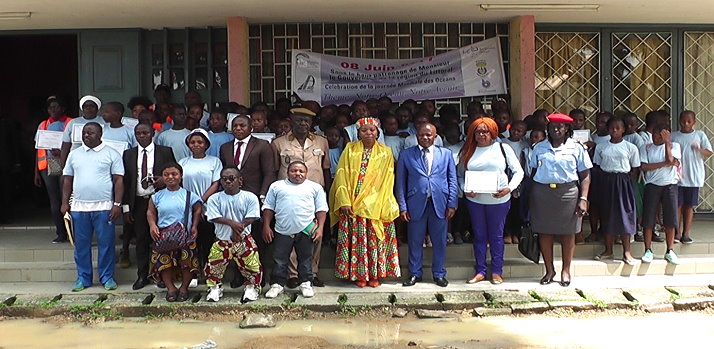
The Friendly of soccer schools and Mundus maris celebrating in Hann, Senegal
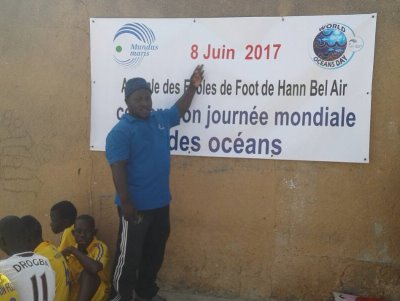 The leaders of the sporting world of the fishing community of Hann celebrated World Oceans Day, 8 June together with Mundus maris.
The leaders of the sporting world of the fishing community of Hann celebrated World Oceans Day, 8 June together with Mundus maris.
Unlike previous editions organised by the soccer school "Maison Foot", the one of 2017 was initiated by the “Friendly” grouping all 12 soccer training schools in Hann.
According to the persons in charge, the importance of their involvement in any initiative favourable to the conservation and protection of the environment in general and of the oceans in particular is justified.
They cite, among other things, the ability to convey messages through sports activities to the people, especially the young ones (see interview with Alassane Diallo, communication chief of the soccer school "Maison Foot").
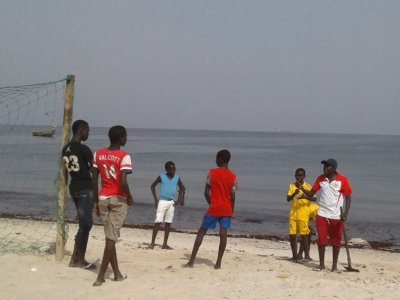 The programme for the day was set as follows:
The programme for the day was set as follows:
-
organisation of upgrading sessions in training centers for the benefit of pupils - trainers on the Mundus maris association, its objectives and the merits of the Day
-
beach cleaning;
-
a beach soccer tournament once the beach was cleaned up.
At the end of the tournament, the first four teams went through to the semi-final and final stages. The training centers "Maison Foot" and "Challenge Foot" competed in the final. Challenge Foot in blue outfit won.
The president of the Mundus maris Club Senegal awarded the trophies but especially food to the recipients. It should be pointed out here that because of the particular contest coinciding with the month of Ramadan, our interlocutors in the schools had deemed it necessary to provide rewards in the form of foodstuffs, thus enabling all the participating teams to have enough to break the fast at their ease after sunset.
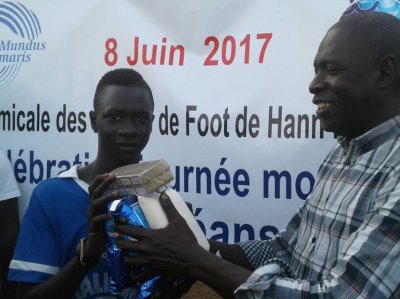 In terms of lessons to be learned and future prospects agreed upon at the end of the 2017 edition, the following emerged:
In terms of lessons to be learned and future prospects agreed upon at the end of the 2017 edition, the following emerged:
-
The idea of working with the “Friendly of soccer schools” holds greater potential for the future. In this context, we owe a special recognition to the Centre "Maison Foot", which for some years already has collaborated with Mundus maris for World Oceans Day and has played this time a catalytic role in having succeeded in mobilising the other training centers around the event;
-
In the opinion of some leaders of the "Friendly", for a more sustained effort in convening the tournament and promoting ocean protection, the collaboration should not be a one-off event in a day dedicated to the oceans. In their view, they would like Mundus maris to link with World Ocean Day organisers so that educational materials (films, posters about the environment in general and oceans in particular) can be made available to them, so that these centers can integrate these into their training curriculum. It may be necessary to recall here that the training centres provide the same courses as those in primary schools at the same time as offering soccer training. This strategy aims to give young people who have not broken through in football a chance to continue their education in high school after the CM2, if necessary.
World Ocean Day organised by Mundus maris at FUTA Staff Secondary School, Akure, Ondo State, Nigeria
by Oke Israel, FUTA
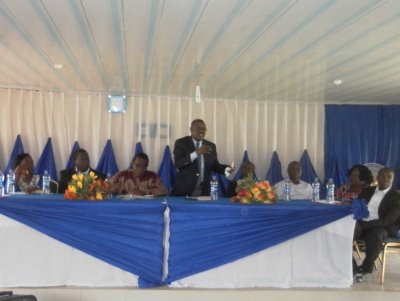 The programme started with the arrival and registration of guests from 9:30am to 10:00am on 8 June 2017.
The programme started with the arrival and registration of guests from 9:30am to 10:00am on 8 June 2017.
The opening prayer was said by Mr Ajayi (FUTA Staff School), this was followed by introduction of the guests and participants by Miss Imoru Ruth (FUTA Protocol officer). Some of the participants introduced to the high table included, Prof. O.A.Fagbenro (The Chairman), Prof. L.C. Nwana (Former HOD, FAT Department, FUTA), Dr. J.B. Bolarinwa (Lead paper presenter), Mr. Ikuyinminu (Principal, FUTA Staff School), Mrs Adekanbi (FUTA Staff School Vice Principal, Academics and LOC Member), Mr Ajakaye (FUTA Staff School Agriculture teacher and LOC member) and Mr Ajayi (FUTA Staff School Vice Principal, Administration).
This was followed by the chairman address from the chairman of the day, Prof. O.A. Fagbenro. Goodwill and welcome address was delivered by Mr. Anthony Ikuyinminu (Principal, FUTA Staff Secondary School).
He welcomed all the participants and highlighted the importance of the ocean to sustaining lives on Earth. He also emphasised the timely theme of this year ocean day tagged "Our Ocean; Our Future". The Principal, FUTA Staff Secondary School, concluded that the importance of the ocean can not be overemphasised especially for the sake of posterity.
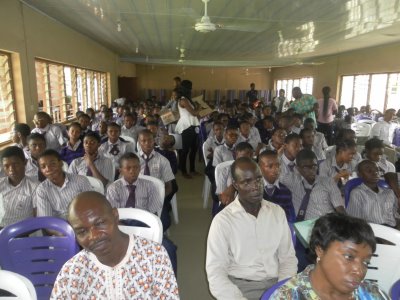 The lead presentation titled "Our Ocean: Our Future" was delivered by Dr. J.B. Bolarinwa from the Department of Fisheries and Aquaculture Technology, The Federal University of Technology, Akure, Nigeria. Some of the highlights of his updated key points are as follows:
The lead presentation titled "Our Ocean: Our Future" was delivered by Dr. J.B. Bolarinwa from the Department of Fisheries and Aquaculture Technology, The Federal University of Technology, Akure, Nigeria. Some of the highlights of his updated key points are as follows:
-
The World Oceans or global ocean (colloquially called the Sea) is the interconnected system of Earth’s oceanic waters and comprises 71% of the combined surface of the planet covering about 361 million km2.
-
The ocean is rich in marine resources and it is assumed that life originated in the oceans leading to all living organisms on land and water today: bacteria, plants, animals including humans. Different aquatic fauna and flora derive different resources from marine biome. The most valuable natural resources can be found in the oceans. These include food in form of fish, shellfish and aquatic weeds. According to the catch reconstructions of the Sea Around Us Project, current human extractions from the ocean are estimated to have peaked at about 130 million tons in 1996, declining ever since, particularly in the industrial segments of fisheries (Pauly and Zeller, 2016, 2017) (1).
-
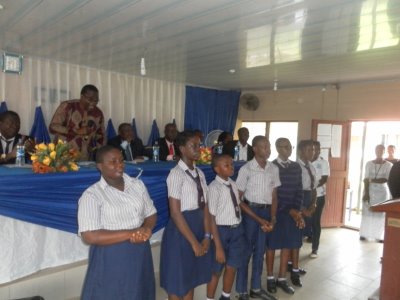 The ocean removes carbon from the atmosphere and provides oxygen through the photosynthetic activities of aquatic algae. The ocean has the capacity to collect, drive, mix water heat and carbon dioxide. It can hold and circulate more water heat and carbon dioxide than the atmosphere. Massive uptake of anthropogenic CO2 emissions is leading not only to thermic expansion of the ocean as a result of warming, but also reduction in oxygen content (warmer water contains less dissolved oxygen) and acidification.
The ocean removes carbon from the atmosphere and provides oxygen through the photosynthetic activities of aquatic algae. The ocean has the capacity to collect, drive, mix water heat and carbon dioxide. It can hold and circulate more water heat and carbon dioxide than the atmosphere. Massive uptake of anthropogenic CO2 emissions is leading not only to thermic expansion of the ocean as a result of warming, but also reduction in oxygen content (warmer water contains less dissolved oxygen) and acidification. -
Overfishing of Nigerian territorial waters have also been reported by various authors due to poaching, poor implementation of fisheries policies, poor enforcement of fishing laws and regulations and high anthropogenic pressure on the waters. Pollution and climate change constitute further strain on ocean health (Bolarinwa et al., 2016 ) (2).
-
There is a need to know the pollution status of Nigerian marine waters and the extent of loss of biodiversity. Marine organisms such as marine algae, plants, worms, corals, echinoderms (star fish), crustaceans, cephalopods (squids and octopus), commercial reef and deep sea fishes, sharks, marine birds, sea reptiles and turtles and marine mammals (whales) are becoming threatened and endangered, hence the need for the government to commit more funds to research on pollution, surveillance surveys, biomass estimates and marine protection.
The keynote and lead paper presentation was followed by the question and answer session, students and participants asked various questions about the lead topic. The questions were answered by Prof. Fagbenro, Prof Nwanna and Dr Bolarinwa.
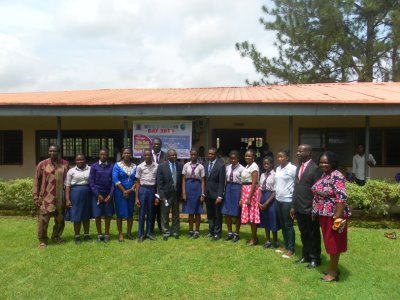 Immediately after this session, the Mundus maris awardees were recognised by the chairman, Prof. O.A. Fagbenro. He called the names of the seven awardees all from FUTA staff secondary school - congratulations!
Immediately after this session, the Mundus maris awardees were recognised by the chairman, Prof. O.A. Fagbenro. He called the names of the seven awardees all from FUTA staff secondary school - congratulations!
Furthermore, Prof Fagbenro promised tuition scholarship to anyone of the awardees that wish to study any course related to Ocean resources management in any Nigerian university.
Finally, the vote of thanks was given by Dr. O.K. Gbadamosi, who appreciated all participants, lead speakers and guests for the making the year 2017 World Ocean Day (WOD 2017) celebration a success in FUTA. The Closing prayer was said by Mr .Ajakaye (FUTA Staff Secondary School). This was immediately followed by the photo session. The group photo shows the awardees with the guests.
(1) Pauly, D. and D. Zeller, 2016. Catch reconstructions reveal that global marine fisheries catches are higher than reported and declining. Nature Communications, DOI: 10.1038/ncomms10244, and
Pauly, D. and D. Zeller, 2017. Comments on FAOs State of World Fisheries and Aquaculture (SOFIA 2016). Marine Policy, 77:176-181.
(2) Bolarinwa, J.B., A.A. Ogunbona, O.J. Ishola and F.O. Ogundana, 2016. Socioeconomic Survey and Cost-Benefit Analysis of Artisanal Fisheries in Egbin Waterside, Lagos Lagoon, Lagos State, Nigeria. Int.J.Res.Agric.Forestry, 3(11):1-5.
World Oceans Day in Abbassa, Egypt
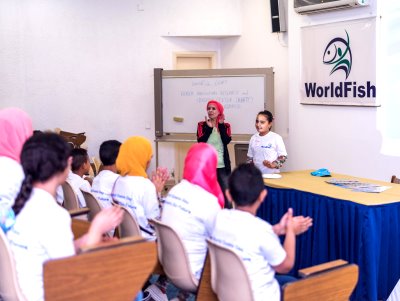 This year, we struck up a partnership with WorldFish Abbassa in Egypt for the first time and they celebrated wonderfully with an entire class of school children and their teachers, who were able to discover how science can contribute to sustainable food production from aquaculture.
This year, we struck up a partnership with WorldFish Abbassa in Egypt for the first time and they celebrated wonderfully with an entire class of school children and their teachers, who were able to discover how science can contribute to sustainable food production from aquaculture.
The idea was picked up by the Abbassa team as proposed by Dr. Lydia Adeleke Mosunmola, an AWARD Fellow of the Federal University of Technology in Akure who was at the WorldFish Center Abbassa, Egypt at that time for her Advanced Science Training organized by the African Women in Agriculture Research and Development (AWARD).
Due to Ramadan, the school preferred the excursion to celebrate World Oceans Day for the period afterwards.
Encouraged by WorldFish Country Director Malcolm Dickson, who also accepted to serve on the international jury for the Mundus maris Awards youth contest, Mona El Azzazy shouldered much of the preparatory work and mobilised several colleagues and collaborators to make the day memorable for the kids.
The happy faces of the family photo at the end show that the team succeeded well.
Congrats and let's continue next year!
